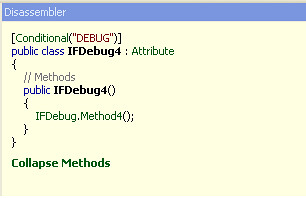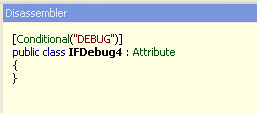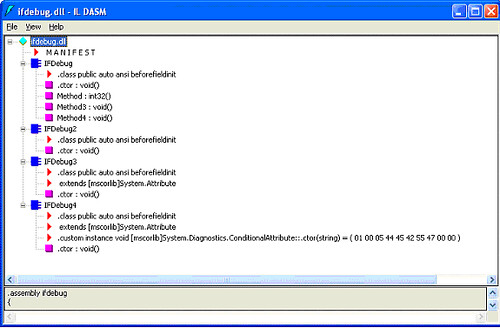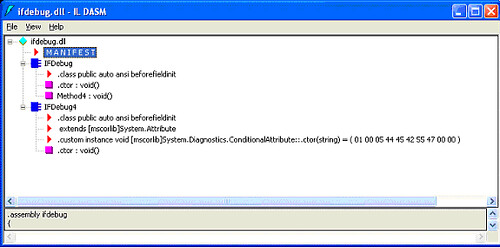1 using System;
2 using System.Diagnostics;
3 public class IFDebug
4 {5 #if DEBUG
6 public int Method ()
7 {
8 return 5;
9 }
10 11 #endif
12 //error CS0578: The Conditional attribute is not valid on
13 //'IFDebug.Method2()' because its return type is not void
14 /*
15 [Conditional("DEBUG")]
16 public int Method2()
17 {
18 return 5;
19 }*/
20 #if DEBUG
21 public void Method3 ()
22 {
23 }
24 25 #endif
26 [Conditional("DEBUG")]
27 public static void Method4()
28 { 29 } 30 31 } 32 33 34 #if DEBUG
35 public class IFDebug2 {
36 }
37 38 39 #endif
40 //ifdebug.cs(28,2): error CS1689: Attribute
41 //'System.Diagnostics.ConditionalAttribute' is
42 //only valid on methods or attribute classes
43 /*
44 [Conditional("DEBUG")]
45 public class IFDebug3
46 {
47 }*/
48 //So, let's compare apples to apples
49 #if DEBUG
50 public class IFDebug3 : Attribute{
51 }
52 #endif
53 54 [Conditional("DEBUG")]
55 public class IFDebug4 : Attribute
56 {57 public IFDebug4()
58 { 59 IFDebug.Method4(); 60 } 61 62 } 63 Consider the above code. Let's say I compile it with
c:\> csc /t:library /define:DEBUG ifdebug.cs
The ILDASM screenshot looks like this:
What if I do a RELEASE build?
So, it simply means that [Conditional("DEBUG")] classes get carried to RELEASE builds. But is that all? Nope... Calls to methods adorned with Conditional("DEBUG"), evaporate - disappear - in RELEASE builds. Here are the screenshots from Reflector:
 |
 |
How is it useful? Practical usage? Wait for my next post :)



No comments:
Post a Comment